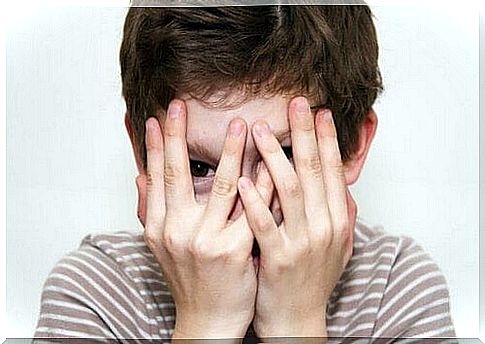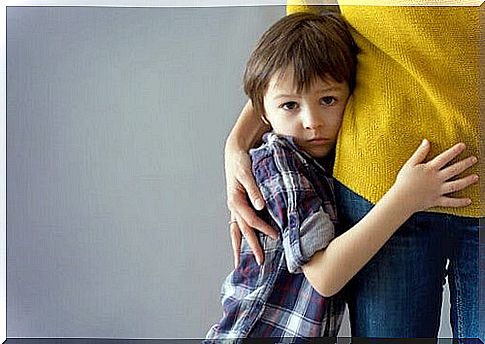How To Overcome Shyness In Childhood

Although the origin of shyness may be genetic, the children’s parents and surroundings have a great influence. However, with the appropriate approach, children can overcome shyness in childhood.
Although shyness is a very common personality trait, it can be a serious problem for some children.
To help children overcome childhood shyness, it is necessary for parents to understand what happens to children in each of the stages of childhood.

Signs of shyness in childhood
Many children are naturally shy from the moment they are born. Much of their behavior in relation to shyness is due to their neurochemistry. This is why they become wary of new situations.
The first months
During the first months of life, some babies are more tolerant of other people’s company, even though these individuals do not belong to their normal environment. The baby generally feels comfortable when someone smiles at him.
In this phase, the baby recognizes his parents. But he is unable to identify their faces. Therefore, taking care of their needs and their demands for attention, it helps to prevent excessive shyness in the later stages.
Six months old
When a baby turns six months old, it tends to be suspicious. It is now that he recognizes the face of the parents, as well as those he spends a lot of time with. For this reason, a new face is foreign to him, which can cause uncertainty.
In this childhood phase, it is very common for the child to feel support and security. He looks for recognizable things in people he constantly sees. When these people are not present, it creates separation anxiety.
Many parents usually force the separation because they fear that their baby will achieve complete dependence. But this is something that the baby should learn on its own. As the baby grows, he will begin to feel more secure while shyness manifests in one form or another.
Two years old
Children are not used to greeting strangers when they are two years old. They often hide behind their parents and they need their parents to feel safe.
While this behavior is associated with shyness, children at this age are in fact socially selective. If they are not with other children, it is not because they do not bother, but because they prefer to play alone.
However, if this shyness in childhood is excessive, it can be a problem. If the child is three years old and he still has no social interests, if he does not play with other children, if he becomes insensitive to physical contact, if he does not express himself clearly, or he shows anxiety about new situations, then it may be necessary to enlist the help of an expert.
Three years old
From the age of 3-6 years, the child begins to develop certain intuitive habits, which is why he is able to have lots of interactions with others. But this can also create certain kinds of fear, making him more sensitive to contact with others.
The child often gets worried about what others think of him and he cannot bear negative comments. He is also afraid that he will not live up to his family’s expectations. He may become self-critical, focus on his weaknesses and think he lacks the courage to face fearful situations.

How to overcome shyness in childhood?
First of all, it is necessary to take into account how children manifest their emotions. Often, children’s behaviors, their playfulness, and drawings can reveal how they are feeling. This is useful as in the early stages they have difficulty expressing these feelings in words.
- Young children can often be intimidated in front of strangers. If they play, they stop. Parents need to reassure the child so that the child can overcome this unpleasant moment. A smile, a hug or an encouraging word is a great help for children so they can build trust.
- Even if the child does not feel comfortable, it does not make sense to keep him from others. It will help to integrate the child. This social approach is useful as it will make the child feel relaxed in front of other people.
- When the child is a little older and when he is in the phase where he is listening and reasoning with others, it does not make sense to tell him that he is shy. This may appear as criticism, and as a consequence of this, the child may withdraw more.
- To make the child feel more secure, it is wiser to express that the child needs time to feel comfortable around others.
- It is also important to have realistic expectations, as shyness in childhood can be endured. However, if you expect too much from your child, it can have consequences for his behavior.
Is it possible to overcome shyness in childhood?
While this may be worrying, there is no way to know if a shy child will stop being shy. In many cases, children overcome shyness during childhood. They tend to open up more as they get older.
As a mother or father, you can make an effort to offer stability, support and care. If you help your child feel comfortable, he will have more confidence to overcome shyness in childhood.









